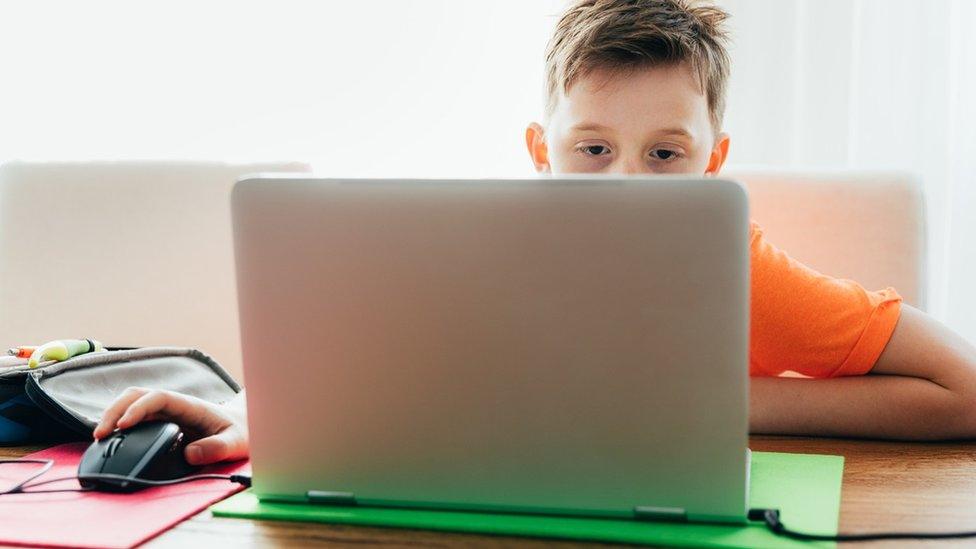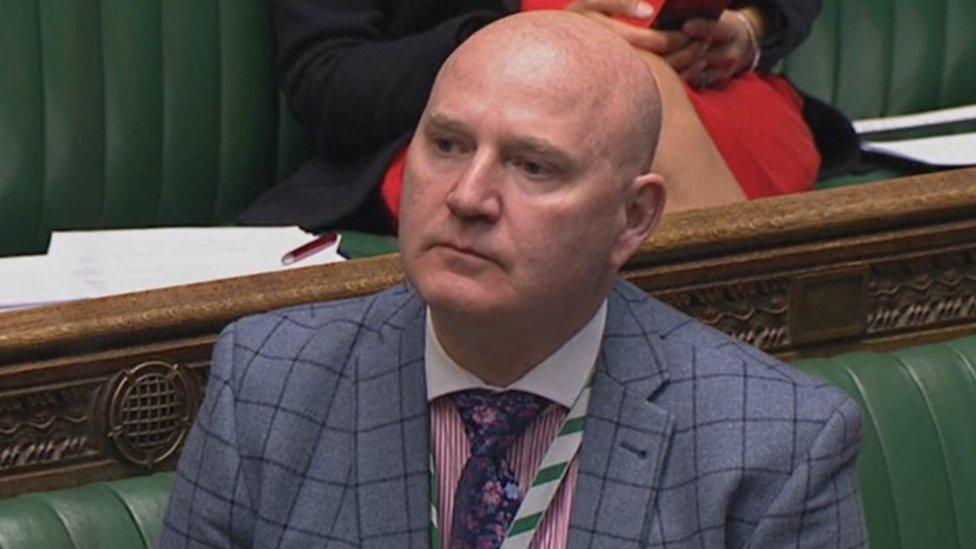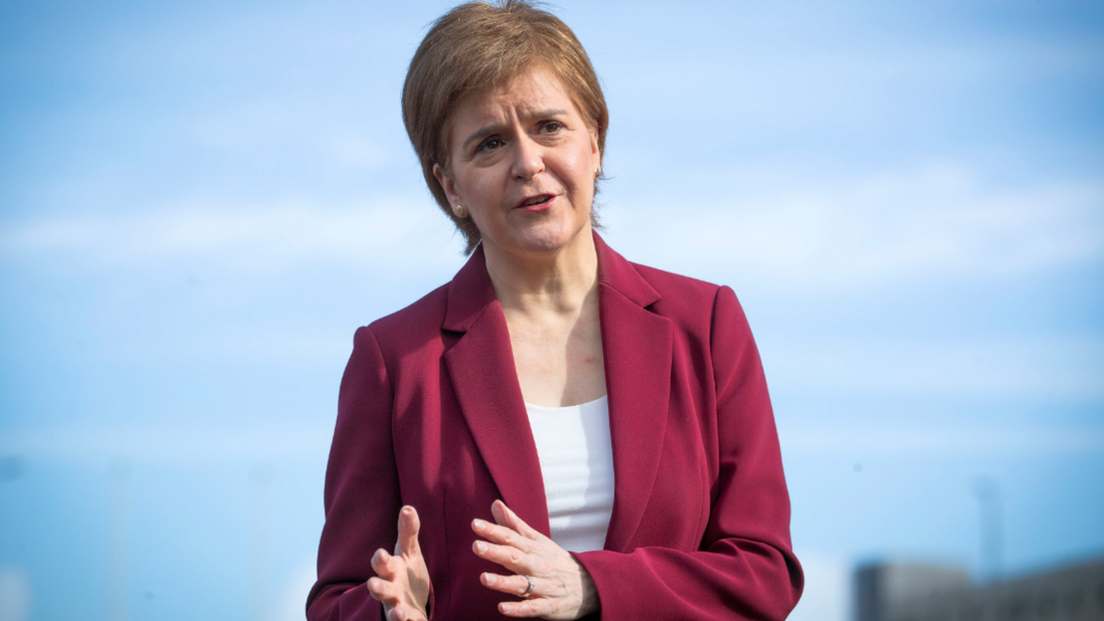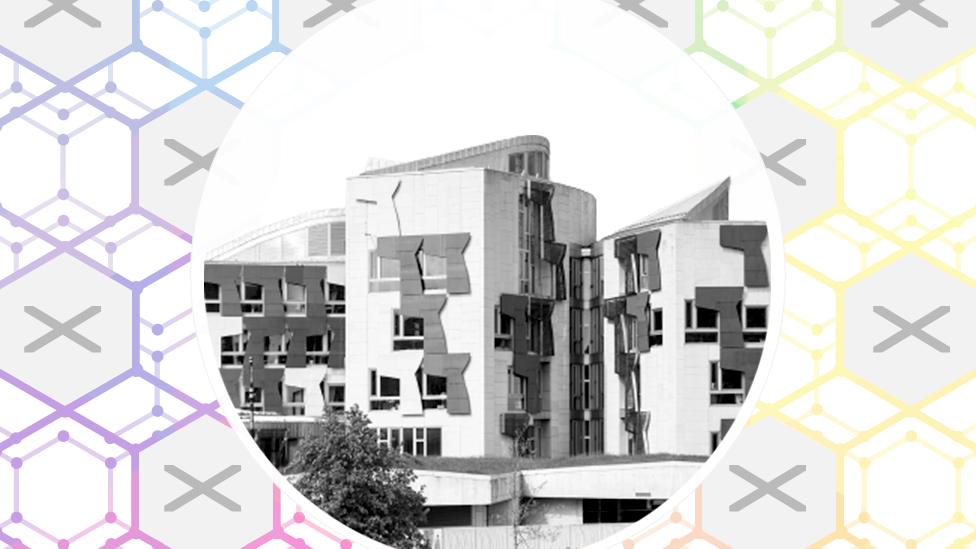Willie Rennie: Focus of next parliament must be Covid recovery
- Published
Willie Rennie: 'Let's focus on recovery and make a difference to our country'
Scottish Liberal Democrat leader Willie Rennie has said the focus of the next parliament must be the recovery from the Covid pandemic, not independence.
He said the ongoing row over another referendum and arguments between Nicola Sturgeon and Alex Salmond had left people "filled with utter dread".
Mr Rennie's comments came as a second SNP MP defected to the new Alba Party.
On the campaign trail, the SNP pledged to provide all schoolchildren with a laptop, Chromebook or tablet.
Deputy First Minister John Swinney said the move, which will cost £350m, will help to end Scotland's "digital divide".
The SNP has also pledged that no-one under the age of 21 will have to pay council tax if they are re-elected to power in May.
Finance Secretary Kate Forbes said this was in recognition of the coronavirus pandemic having a "stark impact on the job prospects of our young people".
Elsewhere, the Scottish Greens plan to move the age children start formal schooling to seven and instead introduce a play-based kindergarten stage for the early years in a bid to reduce the attainment gap.
But despite the policy announcements, the narrative continues to be dominated by Alex Salmond's new party and its bid to create a "supermajority for independence" by fielding list candidates.
On Saturday, Scottish Conservative leader Douglas Ross wrote to Mr Rennie and Scottish Labour leader Anas Sarwar and urged them to work together to preserve the union.
'Terrible year'
Asked about the approach, the Scottish Liberal Democrat leader told BBC Scotland's The Sunday Show: "Our priority is to put recovery first for the country because we have had a terrible year with the pandemic.
"Douglas loves his gimmicks but he's part of the problem, not part of the solution."
Mr Rennie also said he was "not interested" in going into a coalition with any other party and claimed the SNP were "in decline" and would not win a majority.
Asked about the Alba Party, he said: "People must be filled with utter dread at that this next parliament could be dominated by the the issue of independence, when we have got this massive trauma to get over, and also the arguments between Nicola Sturgeon and Alex Salmond."
The Scottish Liberal Democrat leader also said he would "love to be a member of the EU" but that the debate had moved on and he did not plan to push on rejoining.
And he admitted he was "very sceptical" about plans for vaccine passports as they currently excluded half the population.

SCOTLAND'S ELECTION: THE BASICS
What elections are happening? On 6 May, people across Scotland will vote to elect 129 Members of the Scottish Parliament (MSPs). The party that wins the most seats will form the Scottish government. Find out more here.
What powers does the Scottish Parliament have? MSPs pass laws on most aspects of day-to-day life in Scotland, such as health, education and transport. They also have control over some taxes and welfare benefits. Defence, foreign policy and immigration are decided by the UK Parliament.
How do I vote? Anyone who lives in Scotland and is registered to vote is eligible, so long as they are aged 16 or over on the day of the election. You can register to vote online, external.

Meanwhile, the SNP has vowed to give every school child in Scotland a brand new computer device and a free internet connection.
The deputy first minister said the programme would also provide technical support and training for teachers so they could better help Scotland's children as they learned on the new devices.
And he said the SNP would deliver funding to councils to improve schools' electronic infrastructure, such as networking within schools and internet bandwidth.

The SNP has pledged to give all schoolchildren a laptop or tablet
In a speech to the SNP campaign conference Mr Swinney said: "A child cannot do their homework on mum or dad's phone. And they cannot study online if they can't connect to the internet. These tools are no longer luxuries. They are the basic building blocks of a good education.
"It is time now to recognise that. And, because education is about levelling up, it must be done for everyone. Rich and poor alike.
"Just as in my day, the teacher handed out a jotter to all, so in this internet age, we will hand each child the device they need to learn and prosper."
Scottish Labour's deputy leader Jackie Baillie said: "The facts speak for themselves - under the SNP, the digital divide between the wealthiest and the poorest has grown.
"Time and time again, the SNP has missed its own targets for the rollout of devices - leaving some of the poorest children without access to vital technology and experts baffled at the sluggish pace of the programme.
"After 14 years of SNP failure, the people of Scotland deserve better. Scottish Labour is focused on delivering a national recovery plan that works for the people of Scotland."
'Track record'
Scottish Conservative leader Mr Ross said: "While we will all agree that the focus has to be on our recovery from Covid-19 and rebuilding from the pandemic, we can't do that while the Nationalists are determined to take us through another divisive and damaging independence referendum.
"We should be focused on getting through the health pandemic and taking on the emergency that will follow, and have the Scottish Parliament 100% laser-focused on our recovery and rebuilding.
"All pro-UK parties have to recognise that and that's why I continue to make the offer to Scottish Labour and Scottish Liberal Democrats to work with us.
"We don't agree on everything, we will never agree on everything, but we should agree about the threat the Nationalists pose to Scotland and to the rest of the UK."
Putting forward its plans to delay the age children start school the Scottish Greens said studies showed that under 7s responded to and developed better with play-based learning, while formal assessments in literacy and numeracy in the early years could put some off learning.
Co-leader Patrick Harvie said: "The Scottish Greens believe Scotland should ditch the British model of starting school at four or five and instead look to our Scandinavian cousins.
"Finland is renowned for its education system, and it is recognised that kindergarten leads to better outcomes later in a child's school career.
"The Scottish Greens would introduce this system in Scotland as part of our plans for a green recovery from the pandemic."

POLICIES: Who should I vote for?
PODLITICAL: Updates from the campaign

Related topics
- Published28 March 2021

- Published27 March 2021

- Published7 May 2021
